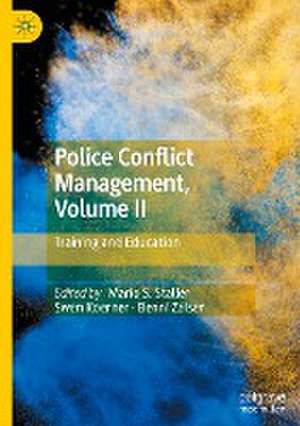Police Conflict Management, Volume II: Training and Education
Editat de Mario S. Staller, Swen Koerner, Benni Zaiseren Limba Engleză Hardback – 29 dec 2023
This book, as part of a two volume set, provides a broad overview of the current state of research on conflict management in law enforcement contexts globally, with a focus on training and education. They cover a wide range of interactions between police and the public. This volume (II) focusses on training and education and the learning settings that play a prominent role in providing police officers with the knowledge structures, competencies, attitutes, and values that they need to professionally tackle contemporary challenges. Volume I focusses on the contemporary challenges and opportunities in policing and ethical considerations. These books bring together leading research that is determining the state of the art in communication, de-escalation, use of force, and other contemporary issues in policing, with practical Key Takeaways in each chapter. They broaden the field by focussing on research which goes beyond the US, including in Scandinavia, Switzerland, the Netherlands, Germany, the Republic of South Africa and Russia.
Preț: 790.28 lei
Preț vechi: 963.76 lei
-18% Nou
Puncte Express: 1185
Preț estimativ în valută:
151.24€ • 164.22$ • 127.04£
151.24€ • 164.22$ • 127.04£
Carte tipărită la comandă
Livrare economică 23 aprilie-07 mai
Preluare comenzi: 021 569.72.76
Specificații
ISBN-13: 9783031410994
ISBN-10: 3031410998
Ilustrații: XI, 430 p. 9 illus., 1 illus. in color.
Dimensiuni: 148 x 210 mm
Greutate: 0.68 kg
Ediția:1st ed. 2023
Editura: Springer International Publishing
Colecția Palgrave Macmillan
Locul publicării:Cham, Switzerland
ISBN-10: 3031410998
Ilustrații: XI, 430 p. 9 illus., 1 illus. in color.
Dimensiuni: 148 x 210 mm
Greutate: 0.68 kg
Ediția:1st ed. 2023
Editura: Springer International Publishing
Colecția Palgrave Macmillan
Locul publicării:Cham, Switzerland
Cuprins
Chapter 1: Training and Education for Police Conflict Management.- Chapter 2: Criteria for High Quality Training of Police Officers.- Chapter 3: Empowering police trainers: Introducing the costraints-led approach for the design of effective learning environments in police training.- Chapter 4: Coaching Police Conflict Management.- Chapter 5: Sport Psychology Applied to Tactical Training of Law Enforcement Officers.- Chapter 6: Moral Injury as a Challenge in a Value-driven Profession- Insights from Ethics for the Education and Training of Police Agents.- Chapter 7: Martial arts myths in police use-of-force training.- Chapter 8: Police checks and arrests escalating into conflict: Coping principles and strategies taught in Swiss police academics drawn from research in social psychology.- Chapter 9: How officers perform and grow under stress: Police training in virtual reality.- Chapter 10: Trialogic interventions: An innovative anti-stigma module for de-escalation trainings.- Chapter 11:An Evidence-Informed Approach to De-escalation Training.- Chapter 12: De-escalation Fundamentals.- Chapter 13: Police Hostage and Crisis Negotiation Training: Foci, Protocols and Best Practice Principles.- Chapter 14: Tactical Gaze Control and Visual Attention in Law Enforcement.- Chapter 15: Professional Shooting Tests in South Africa: A Qualitative-Descriptive Study and Critique.- Chapter 16: Police Training and Police Violence in Scandinavia.- Chapter 17: Leadership as a mental shield: How leaders of specialised police units promote inner resilience and mental stability.
Notă biografică
Mario S. Staller is a professor at the University of Applied Sciences for Police and Public Administration North-Rhine Westphalia in Aachen, Germany.
Swen Koerner is a professor at the German Sport University and Head of the Department of Training Pedagogy and Martial Research.
Benni Zaiser, PhD, is an officer with one of Canada’s largest police services and an independent behavioural scientist with an interest in the intersection between cognitive and social psychology during encounters between the public and the police.
Caracteristici
Broadens the field by focussing on research beyond the US, including from the Global South Comprehensively covers research and the corresponding training and education on conflict management Speaks accessibly and practically to academics and practitioners with Key Takeaways in each chapter
